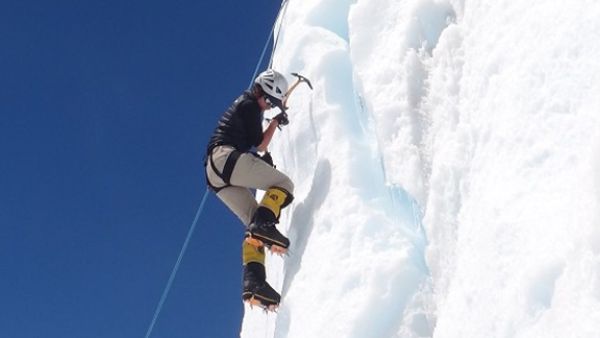She had to ask her father, and her father gave an unequivocol "no". Devastated, yet relentless, Moharrak pursued the issue, penning her father a long email, agonisingly waiting for a response.
After several days, three short heart-warming phrases were sent back:
"You're crazy. I love you. Go for it."
The words changed her life. And Moharrak has used her achievements ever since to act as an ambassador for her countrywomen.
Advocating access to sport for girls in school, and sport for health in Saudi Arabia, Moharrak is one of a line-up of outstanding female role models attending the eighth annual Women in the World Summit in New York City between 5-7 April.
With Hillary Clinton conducting her first post-election interview here, the summit is also presenting "powerful new female role models whose personal stories illuminate the most pressing international issues".
Before the summit kicked off, The New Arab met with Moharrak to talk about her life and work.
"Of course, the main one is the cultural barrier. I come from Saudi Arabia, where it's not typical for a girl to be athletic, let alone a mountain climber.
"It's very far from [society's] grasp of what a Saudi girl is. Which, of course, also meant my that of father and my family initially."
When did this all start for you?
"I've always been very sporty. I've done it my whole life. The first thing I did was learn how to swim."
When sports aren't really encouraged among girls in school, was there an infrastructure with which to train?
"Because sports aren't really viewed as a female thing, it's not popular in schools. Personally, I've always been very energetic and very curious. So even though I didn't have these things available, I still wanted them and I still asked my parents - 'oh, I want to learn horse riding', or I want to do this and that.
"I didn't just hear 'no you can't do sports because you're a girl' and say 'OK'. I asked 'Why not? Why can my brother play football but I cannot learn horse riding?' Maybe the difference is my own personality, whereas others may see a barrier and stop.
"But I was fortunate enough to have understanding parents and we had a big house with a big garden. Otherwise, it would have been very difficult to facilitate as a child. As an adult, as soon as I went to college [in Sharjah, UAE], I threw myself into everything."
What has your advocacy work involved?
"I've been talking to as many people as I can - basically! Trying to change mentalities, whether its girls' schools at home or advocacy groups.
"I recently spoke at the Human Rights Watch gala dinner in Frankfurt, for instance. I try to collaborate with Shirzanan as much as possible. They are working to highlight inequality in sports, which is really overshadowed by a lot of other things - in terms of media coverage on the region - like driving.
"But something as simple as sport should be enjoyed by the masses rather than an elite group of people."
Does this affect both men and women?
"In general sports back home needs revamping in many aspects - but more so for girls than boys. Because boys do have the luxury of being able to play football in public, as opposed to girls, who can't.
"So, it's another layer of difficulty. For boys, it's about inspiring the child to do sport. For girls, even if she was inspired she would not be able to compete."
What made this such an important issue for you?
"There is a correlation between an active child and a healthy child. If you remove sports from the curriculum for girls, you're already setting them up for a lot of physical ailments such as obesity, diabetes and brittle bone problems.
"When sport is taken out of the equation, like it is in Saudi, then you end up with an unhealthy generation."
What do you want to see ideally happen?
"More opportunities for girls to fall in love with a sport. I always ask: How can you expect to have Olympic-level athletes if they are not born to fall in love with a sport?
"You can't just tap someone on the shoulder and say 'you're going to compete in the Olympics' - it comes from years and years of training."
What inspires you?
"There are two pools of inspiration. Positive and negative. In my case, my inspiration came from a negative place. The fact that I was told I couldn't climb mountains - I was told what I was doing was 'crazy'. This pushed me to change what I didn't like about that mentality."
By Raha Moharrak
This article has been edited from its original source.








